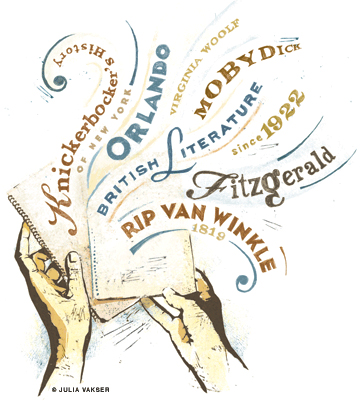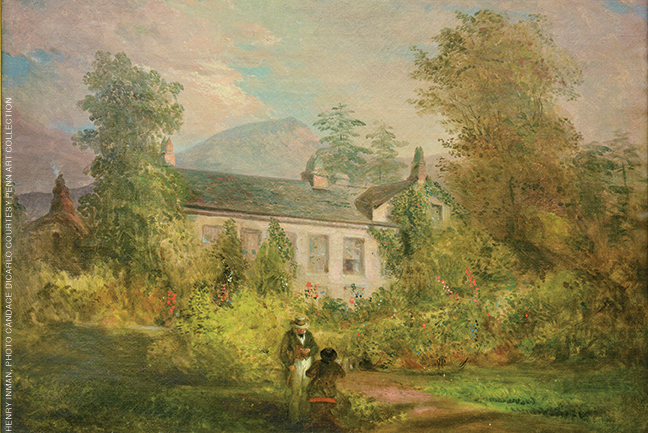
The mid-1960s English classroom, revisited.
By Dennis Drabelle
Eighteenth-century American writers seem to have been unusually clothes-conscious. John Bartram, a botanizing man of letters, roamed the woods dressed all in leather, so as not to bruise the plants. John Woolman, a journal-keeping preacher, decided that since dye-making was grueling work often done by slaves, he would eschew dyed clothes. Tom Paine, the American Revolution’s phrase-making pamphleteer (“sunshine patriots,” “These are the times that try men’s souls,” etc.), declared that “government, like dress, is the badge of lost innocence.” Royall Tyler, a lawyer who helped put down Shay’s Rebellion, wrote a novel in which a female character provokes censure for wearing gloves with skin-baring vents.
Or was Theodore Hornberger, the professor who tossed out these sartorial tidbits 40-odd years ago, the one with the garment fixation? Perhaps so, but I remember him sporting conventional tweeds as he walked in, opened his briefcase, took out the essay he’d written on that week’s topic, and read it aloud. This should have spelled pedagogical disaster, but Hornberger was a good declaimer. He seasoned his delivery with ad libs, and at the first meeting he’d come refreshingly clean. “The study of early American literature,” he said, “is primarily important for what it tells us about the development of our country.” In other words, Don’t expect to enjoy what you’ll be reading for me.
But I did enjoy Hornberger’s course, “American Literature to 1810,” partly because so many of the writers we studied were eccentrics, such as John Cotton, who called his 1646 catechism “Milk for Babes, Drawn out of the Breasts of Both Testaments” (making how many breasts in all? Two? Four?). And I kept detailed notes. I’ve hung on to the spiral notebooks that I bought (45 cents apiece at Zavelle’s) and filled with pronouncements from Hornberger’s and other graduate-level courses I took at Penn in 1965-66, en route to a master’s degree. Recently I went through these time capsules. What were Penn professors saying about prose, poetry, and the wider world four decades ago?
According to my notes, clothes didn’t figure in the lectures of Robert Spiller C’17 G’20 Gr’24, lead author of the monumental Literary History of the United States, whose “American Literature 1810-60” picked up where Hornberger left off. But the writing was getting more interesting now—the divines and polemicists in charge of early American letters were starting to make room for storytellers—even as the required reading accumulated into a burdensome mass. One pleasant surprise was the work of Washington Irving. There was “Rip Van Winkle,” of course, and “The Legend of Sleepy Hollow,” but Irving had written more ambitious stuff, too, such as Knickerbocker’s History of New York, a sprawling satire that, in its range and grotesque exaggeration, lived up to Spiller’s claim that it was one of the first “distinctly American” works.
Knickerbocker’s History also gave rise to an exchange between a lowly grad student and a distinguished American writer. I thought I heard echoes of Irving in the excerpts from Leander Wapshot’s journal tucked into John Cheever’s novels The Wapshot Chronicle and The Wapshot Scandal. And since pinning down influences is an echt scholarly maneuver, I wrote Cheever in care of The New Yorker about my hunch. No go, he replied. “The style and much of the content of Leander’s Journal belonged to my father and he of course may have read Irving although the only master he ever acknowledged was Shakespear [sic].”
Hennig Cohen’s “Major American Authors: Melville” was the meatiest course I took that year. To immerse oneself in practically everything written by a canonical author can be a heady exercise, and Melville in particular repays close study because his work is riddled with philosophical doubts (he titled one of his novels Pierre, or the Ambiguities). Under Cohen’s scrutiny, even the short, ostensibly straightforward novel Billy Budd sprouted contradictions that defy easy interpretation.
Though Melville the artist experimented with form and played with sonorities and wrestled with the limits of what can be known, Melville the mature man was said to be an uncomplicated chap, inured to his hard lot in life. His masterpiece, Moby-Dick, went out of print; his later books sold poorly; and to support his family he had to toil for two decades as a customs agent in New York City. Lesser souls would have despaired, but Cohen cited Melville’s “confidence that gradually, through immense spans of time, man might be able to better himself. All one can do is be moderate and kind and peaceful, attending to the little things that make existence pleasant … food, drink, friends, art.” Applied to a onetime roustabout who had chased whales and jumped ship to cavort on tropical islands with naked damsels (the clothes motif again!), this is a heartening image of well-deserved serenity.
At the time, my classmates and I were a bit hard on Herbert Howarth, who taught “British Literature Since 1922.” He had a plummy voice. He loved to digress. His habit of matching up characters in fiction with the real people on whom they were based (e.g., the fascist Everard Webley in Aldous Huxley’s Point Counter Point equals Sir Oswald Mosley) made modern Brit Lit resemble a kind of grand masked ball. Howarth seemed to have a Ph.D. in gossip, and in my notebook’s margin I find this scribble, presumably addressed to a classmate: “Let’s bring tea and ladyfingers next week.”
But the man knew heaps about all sorts of things, and my notes are larded with his aperçus. While discussing Virginia Woolf’s Orlando, for example, he brought up Richard Strauss’s Metamorphosen for strings. Just as Woolf’s fantasy novel is a romp through English literature, Howarth suggested, so does Strauss’s composition “recapitulate the history of all music.”
Robert Lucid (“American Literature Since 1915”) was a dazzler. At the first meeting, he pointed out similarities between the heroines of two wildly disparate works—Jane Austen’s Pride and Prejudice and Theodore Dreiser’s Sister Carrie—and we were off on a stimulating, semester-long ride. Lucid drew attention to a tiresome strain in Hemingway and Fitzgerald: Their heroes, he grumped, “are always teaching people things.” He had the gall to dismiss the oft-quoted last line of Robert Frost’s poem “Birches”—“One could do worse than be a swinger of birches”—as “an embarrassing disclaimer of all the complex emotional web that has gone before.” And, on Norman Mailer, a Lucid specialty, he delivered a verdict that holds up to this day: Mailer’s “ambitions and designs are probably more interesting than his actual works.”
If I haven’t been pulling out references to Sixties radicalism, it’s because the notebooks contain so few of them. As far as I can tell, only Spiller, the eldest of my professors, alluded to Vietnam, comparing anti-war protesters of “today” to abolitionists of the 1850s and expressing no doubt that if Thoreau were alive he would be championing civil rights for blacks and opposing Lyndon Johnson’s foreign policy. But Spiller said nothing about Thoreau’s sexuality (gay activists have since inducted the author of Walden into the tribe). Similarly, while presiding over a Whitman seminar the following semester, Scully Bradley sloughed over Walt’s homoeroticism—never mind the “libidinous prongs” in “Song of Myself.”
To be fair, though, this was still early in the Sixties as we’ve come to know them. Time magazine had only just spotted college men letting their hair grow long; the Tet offensive, most of the urban riots, and the assassinations of Martin Luther King Jr. and Robert Kennedy lay in the wrenching future; and notions such as semiotics and deconstructionism were still bombinating around inside European heads. If the English department was half-asleep in 1965 and ’66, so was the Sixties zeitgeist.
At Penn, we were strictly professional, faculty and grad students alike. We stuck to what we did best: reading and interpreting assigned texts—mountains of them. Midway through the Spiller notebook, I wrote myself a plaintive note: “Someday reread [Melville’s] Mardi slowly.” Which brings me to the chief hazard of English graduate study. As the staggering number of writers and books discussed in my notebooks attests, if you weren’t careful, the experience could turn one of life’s great joys into a perpetual rush-job.
Dennis Drabelle G’66 L’69 is a contributing editor of The Washington Post Book World.



